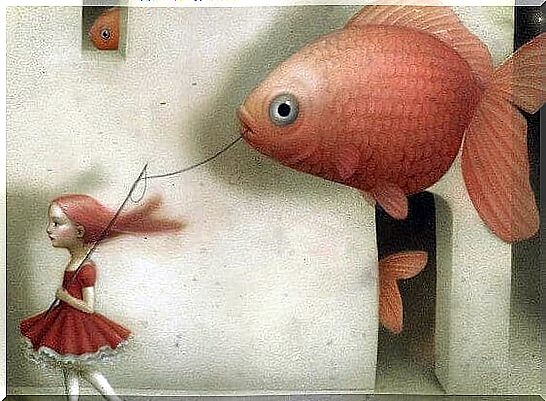Why It Is Important To Set Healthy Boundaries

Not everything that surrounds us is essential. Likewise, not everything we encounter is good for us. If you use appropriate emotional and psychological filters in your everyday life, you can prevent certain “toxins” from penetrating to you. These filters will deter the “wolves in sheep’s clothing” and equally the “viruses” that can cause excessive demands, stress and experiences with a bitter aftertaste.
All of these aspects are important, but as is well known, they should not be regarded as being of equal importance. However, so that you can better understand what it means if you do not “open” these psychological “umbrellas” in your everyday life, let’s talk first about exhaustion. The most common form of exhaustion, as we know, results from exercise. But there is – as strange as that may sound – another type of exhaustion that occurs to a very common extent in the general population and occurs in chronic garb.
“Sometimes disappointment can kill us, only hope lets us survive.”
George Sand
We are talking about the emotional exhaustion that can cause us a whole host of psychosomatic problems. This includes, for example, neck, back and headaches as well as digestive problems. Some simply refer to it as “being burned out”. If you carry around such emotional exhaustion that shifts from the physical to the emotional level and makes us overly cautious, even a hidden depression can develop. And this is not always so easy to determine medically.
The origin of this form of concrete reality often lies in this: We are open and permeable to everything that we encounter and everything that surrounds us. If we do not establish barriers or boundaries and hide behind a protective shield when something displeases us, harms us or causes us stress, we suffer internal defeat. As a result, apathy, discouragement and frustration overwhelm us.
We learn to engage with reality in a different way: We protect ourselves.

Openness – quite a common problem
If you look at the topic of openness in terms of human behavior, it has a concrete and important function: We have to open up to our environment in order to learn something, internalize new systems of knowledge and to survive. When we filter what others give or make available to us, it helps us grow. This is undoubtedly something wonderful.
Sometimes we get exactly what we need. Therefore, if we stick to rigid lines of thought or mentally switch off, it will not help us make progress. Then we will not benefit from new opportunities to be happy either. Most of the time, for this reason, we will have a battle with our brains, which are designed to be receptive. It has large pores like a sponge that strives to absorb everything from its environment.
What our brain instinctively does – and this is where the problem lies – does not, however, correspond to what is necessary for our psychological balance. Our receptivity does not always lead us to personal progress, but on the contrary to an emotional regression. It is exciting to recall the “triad of unhappiness”, as Albert Ellis called it in his Rational Emotive Behavior Therapy (REVT).

According to Albert Ellis , we fall back on three types of irrational expectations in our daily life, which inevitably lead us to classic dissatisfaction.
Aside from these irrational thoughts that we “should do everything right” or that “everyone will treat me the way I wish to be treated”, there is also a third aspect to which we should respond – knowing that “there is no reason for me to deal with my anger or worries.” When we are permeable, we stop opposing what we don’t like. We “dilute” ourselves like a mixture of water and salt. We consume this mixture, which is not wholesome at all, every day. This is not the best for us.
If what you encounter is not good for you, then protect yourself
To what extent are you willing to give in without giving up on yourself? What is the extreme point to which you are ready to go so that others do not drag you into their personal universe? Not everything that crosses your path is good for you or is worth incorporating into your life.
“Everything has its limits, only our creative spirit is unlimited.”
Rabindranath Tagore
It is crucial that we learn how to set appropriate personal boundaries. To help you understand what this basic strategy means for our personal growth, imagine a warm, glowing circle in your mind’s eye that surrounds you. This space inside the circle that we are in is the place that protects us from the outside world. It also allows us to connect with others without being forced to merge with them.

The magic circle
This magic circle, in turn, has fabulous properties: it is pliable and flexible. With its help, we can connect without having to give up our identity at the same time. It can also expand when we perceive something or someone who guarantees us our growth – without causing us any harm.
Well, this circle is wise and incorruptible. If something or someone tries to harm us, the circle will immediately shrink because this barrier is closely related to our values, to our self-worth and our identity. When a potentially harmful influence comes down the path, the circle will simply keep it “out” without further ado. These personal boundaries develop in early childhood and as you grow up. It often happens that at certain times in our life personal boundaries have been damaged and opened with force.
That’s okay so far and not the end of the story. You have the opportunity to repair your limits at any time, heal the broken pieces and draw a new, intact circle that is strong and powerful. A circle flexible enough to know what is good for us. And who also knows what better to leave in the hallway of the uninvited guests, in the anteroom of the wrong friends, the wrong dreams and the wrong hopes.
We have to learn to use our defense barriers sensibly.









